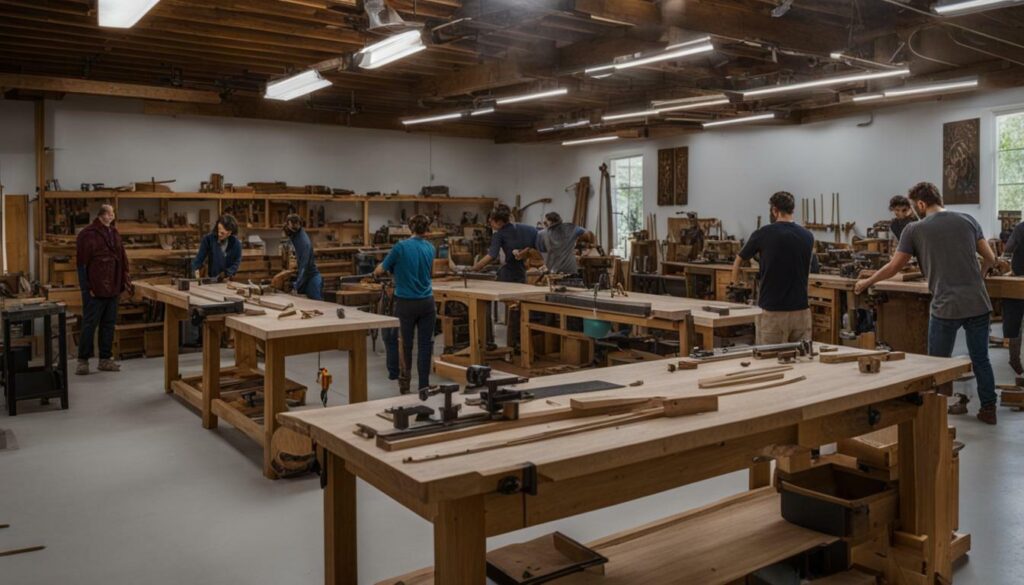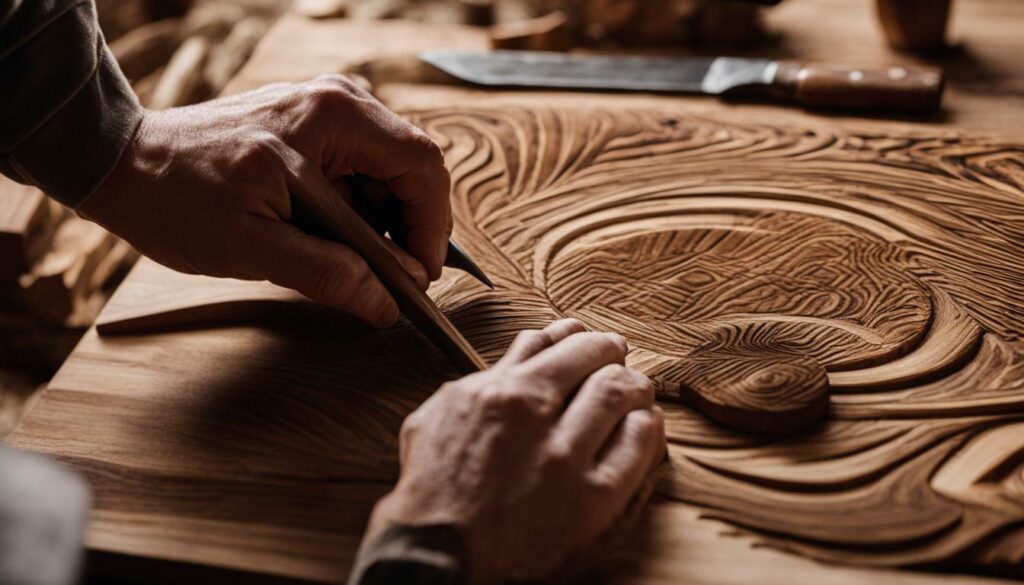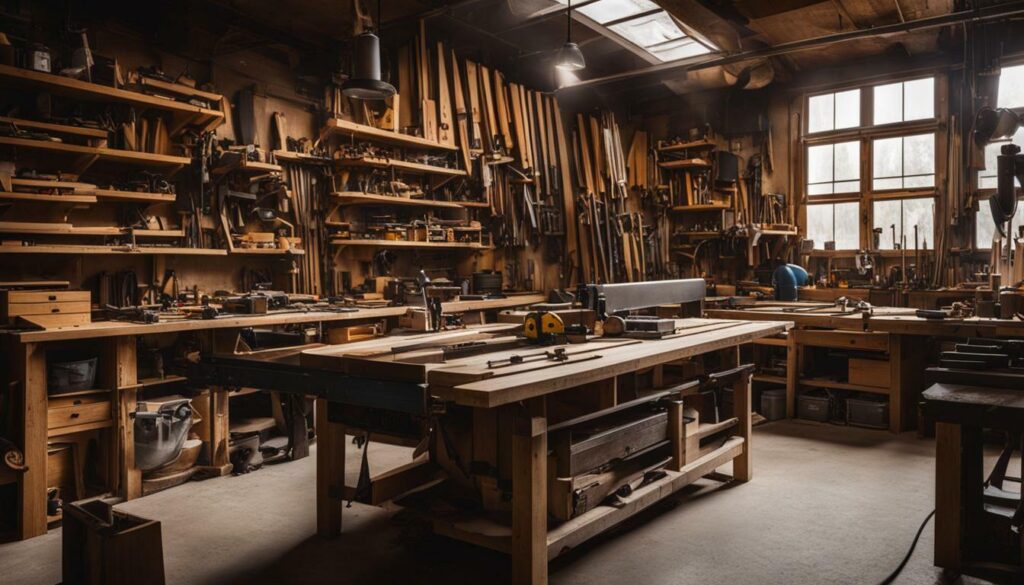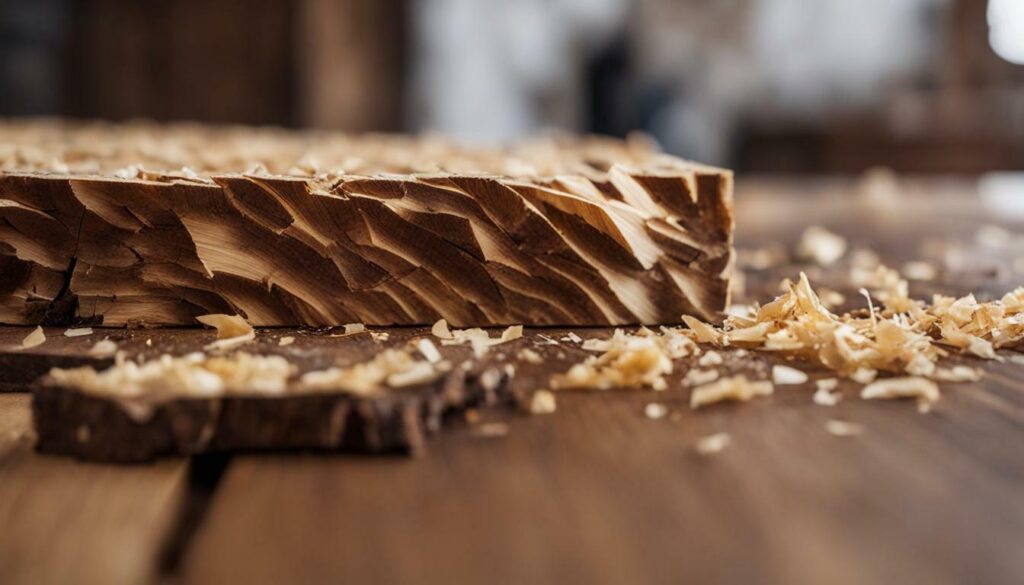Are you looking to enhance your woodworking skills and become a master craftsman? Read on to discover valuable tips and techniques that can help you improve your woodworking abilities.
- Start with small woodworking projects to build skills and gain confidence.
- Take advantage of woodworking workshops and classes for hands-on experience and expert guidance.
- Engage with woodworking forums and communities to learn from fellow woodworkers.
- Utilize woodworking tutorials and online resources for valuable knowledge and techniques.
- Master essential woodworking techniques, such as milling, jointing, planing, sawing, drilling, routing, and shaping.
To improve your woodworking skills, it’s crucial to learn and master various techniques such as milling, jointing, planing, sawing, drilling, routing, and shaping. Starting with small projects is a great way to build your skills and gain confidence. Attending woodworking workshops and classes can provide valuable hands-on experience and expert guidance from seasoned craftsmen.
Engaging with woodworking forums and communities allows you to learn from fellow woodworkers, share ideas, and gain insights. Additionally, there is a wealth of woodworking tutorials and online resources available that offer a treasure trove of knowledge for woodworkers of all levels.
Investing in the right woodworking equipment, such as a table saw, screwdriver set, vice, and wood router, can greatly improve your efficiency and precision. By practicing regularly and taking your time, you can ensure quality craftsmanship and continuously enhance your skills.
It’s essential to develop a solid skillset before investing in expensive tools. Gaining skills first can save you both time and money in the long run. Embracing mistakes and challenges as learning opportunities is crucial in the woodworking journey.
Finally, once you have gained confidence and skills through smaller projects, challenging yourself with larger woodworking projects can further enhance your abilities and elevate your woodworking skills to new heights.
Start with Small Woodworking Projects for Skill Improvement
As a beginner woodworker, it is crucial to start with small projects to gradually build your skills and confidence with woodworking tools and techniques. These projects serve as stepping stones towards more complex and challenging endeavors in the future. By starting small, you can focus on mastering the fundamental skills required for woodworking, such as measuring, cutting, shaping, and joining wood pieces.
Small woodworking projects offer numerous benefits for skill improvement. They allow you to practice using different tools, experiment with various woodworking techniques, and gain a deeper understanding of wood characteristics. Additionally, these projects are less time-consuming and require fewer materials, making them more accessible for beginners.
Examples of small woodworking projects that are perfect for skill improvement include building a simple wooden box, crafting a picture frame, making a cutting board, or constructing a small shelf. These projects not only sharpen your woodworking skills but also provide tangible results that you can be proud of. Remember, the key is to start with achievable goals and gradually challenge yourself as you become more comfortable and proficient.
Table: Small Woodworking Projects for Skill Improvement
| Project | Description |
|---|---|
| Wooden Box | A basic project that introduces you to measuring, cutting, and joining wood pieces. You can customize the box by adding a hinged lid or compartments. |
| Picture Frame | A project that allows you to practice making precise cuts and assembling mitered corners. You can experiment with different wood species and finishes for added creativity. |
| Cutting Board | A functional project that teaches you about wood grain and how to properly seal and finish a food-safe surface. You can incorporate different wood patterns for an attractive design. |
| Small Shelf | A project that introduces you to basic joinery techniques like dado joints or pocket screws. You can customize the shelf by adding decorative elements or incorporating different wood species. |
Remember, the journey of mastering woodworking skills is a gradual process. Take your time with each project, pay attention to detail, and learn from any mistakes or challenges that arise. With dedication and passion, you will continue to improve and eventually tackle more ambitious woodworking projects.
Take Advantage of Woodworking Workshops and Classes
Learning from experienced woodworkers in a workshop or class setting can greatly accelerate your skill development and broaden your knowledge of woodworking techniques. Woodworking workshops and classes provide a hands-on learning experience, allowing you to observe and interact with experts in the field. Not only will you learn valuable tips and tricks, but you’ll also have the opportunity to ask questions and receive personalized guidance.
Attending a woodworking workshop or class can also expose you to new tools, materials, and methods that you may not have encountered before. This exposure can help you expand your creative horizons and push the boundaries of your woodworking skills. Additionally, workshops and classes often provide access to specialized equipment and resources that may not be readily available to you otherwise.
When searching for woodworking workshops and classes, consider the specific areas of woodworking you’d like to focus on. Whether it’s furniture making, cabinetry, carving, or woodturning, finding a workshop that aligns with your interests will ensure that you get the most out of the experience. Look for workshops and classes offered by reputable organizations or instructors with a wealth of experience and positive reviews.
In conclusion, woodworking workshops and classes offer a unique opportunity to learn from experts, gain hands-on experience, and expand your woodworking skills. By immersing yourself in a supportive and educational environment, you can take your woodworking to the next level and unlock your full creative potential.
Woodworking Workshops and Classes – Benefits at a Glance
| Benefits | Details |
|---|---|
| Hands-on learning | Gain practical experience and observe techniques firsthand. |
| Expert guidance | Learn from experienced woodworkers and receive personalized feedback. |
| Access to specialized equipment | Utilize tools and resources that may not be readily available to you. |
| Exposure to new techniques | Expand your knowledge and explore new methods in woodworking. |
| Networking opportunities | Connect with fellow woodworkers and share ideas and experiences. |

“Woodworking workshops and classes offer the perfect environment for growth and learning. The firsthand experience and guidance from seasoned woodworkers can inspire and elevate your craftsmanship to new heights.”
Engage with Woodworking Forums and Communities
Being part of a woodworking community can provide a platform to exchange ideas, get valuable feedback, and learn from the experiences of other passionate woodworkers. Woodworking forums and communities are vibrant online spaces where woodworkers come together to share their knowledge, showcase their projects, and offer support to fellow enthusiasts.
By engaging with these forums and communities, you can tap into a wealth of expertise and gain insights that can help you improve your woodworking skills. Whether you have a specific question about a technique or need recommendations for tools and resources, you can find a supportive community that is eager to help.
Moreover, participating in discussions and sharing your own experiences can contribute to the growth of the community as a whole. It allows you to contribute your unique perspective, inspire others, and develop meaningful connections with fellow woodworkers around the world.

- Access to a diverse network of woodworkers with varying skill levels and expertise.
- Opportunities to learn new techniques, tips, and tricks from seasoned craftsmen.
- Ability to showcase your own projects and receive constructive feedback from the community.
- Exchange ideas, discuss challenges, and find solutions to common woodworking problems.
- Discover new tools, resources, and trends in the woodworking industry.
Recommended Woodworking Forums:
| Forum Name | Description | Website |
|---|---|---|
| The Wood Whisperer | A community dedicated to woodworking education and inspiration. | https://www.thewoodwhisperer.com/ |
| Woodworking Talk | An active community for woodworkers of all levels, offering discussions, tutorials, and project showcases. | https://www.woodworkingtalk.com/ |
| Reddit – r/Woodworking | A subreddit where woodworkers share their projects, ask for advice, and discuss all things woodworking. | https://www.reddit.com/r/woodworking/ |
Engaging with woodworking forums and communities not only expands your knowledge and skills, but it also fosters a sense of belonging within the woodworking community. So, don’t hesitate to join these vibrant online spaces and become part of a supportive network of fellow woodworkers.
Utilize Woodworking Tutorials and Online Resources
The internet offers a vast array of woodworking tutorials and online resources that can guide you through various techniques and projects, helping you build your skills at your own pace. Whether you’re a beginner looking to learn the basics or an experienced woodworker seeking to expand your knowledge, these resources are invaluable in honing your craft.
One of the benefits of woodworking tutorials is that they provide step-by-step instructions and visual aids to help you understand the process. From simple joinery techniques to complex woodworking projects, you can find tutorials that cater to your skill level. These tutorials often include detailed explanations, diagrams, and even videos, allowing you to follow along and practice each technique.
Online resources, such as blogs, forums, and websites, are also valuable sources of information for woodworkers. They provide a platform for sharing ideas, discussing challenges, and gaining insights from others in the woodworking community. You can find tips and tricks, project ideas, tool recommendations, and even expert advice from seasoned craftsmen.
| Benefits of Utilizing Woodworking Tutorials and Online Resources: |
|---|
| 1. Access to a wide range of tutorials and project ideas. |
| 2. Step-by-step instructions with visual aids for better understanding. |
| 3. Opportunity to learn from experienced woodworkers through forums and blogs. |
| 4. Stay updated with the latest trends, techniques, and tools in woodworking. |
Remember to choose reputable sources when utilizing woodworking tutorials and online resources. Look for websites or channels that are known for their accuracy, credibility, and positive feedback from other woodworkers. Additionally, always exercise caution and follow safety guidelines when working with tools and materials.

“The more you learn, the more you’ll realize how much there is still to learn. Embrace the endless possibilities and keep expanding your woodworking skills.” – Unknown
Master Essential Woodworking Techniques
As a woodworker, it is essential to have a solid foundation in various techniques such as milling, jointing and planing, and sawing, which form the basis of many woodworking projects. These techniques require precision, attention to detail, and the right tools to achieve optimal results.
When it comes to milling, it involves shaping and sizing wood using tools like a jointer and thickness planer. Jointing ensures that the edges of your boards are straight and flat, while planing creates an even thickness throughout the wood. These techniques are crucial for creating smooth and uniform surfaces for your projects.
Sawing is another fundamental technique that plays a vital role in woodworking. Whether you’re using chop saws, hand saws, portable circular saws, table saws, chainsaws, bandsaws, or scroll saws, it’s important to master the art of precise cutting. This skill allows you to create accurate shapes and sizes according to your design.
Drilling and boring are techniques used to create holes and cavities in wood. Whether you’re assembling pieces or adding decorative elements, having the ability to drill and bore accurately is crucial. With the right drill bits and drill press, you can achieve clean and precise holes to enhance the functionality and aesthetics of your projects.
| Woodworking Techniques | Tools |
|---|---|
| Milling | Jointer, thickness planer |
| Sawing | Chop saws, hand saws, portable circular saws, table saws, chainsaws, bandsaws, scroll saws |
| Drilling and Boring | Drill bits, drill press |
“Woodworking is a combination of art and skill. Mastering essential techniques like milling, jointing and planing, sawing, and drilling and boring opens up a world of possibilities for creative expression.”
Practicing and Expanding Your Skills
By mastering essential woodworking techniques, you can enhance your overall skill set and take on more challenging projects. It is important to practice these techniques regularly to refine your abilities and build confidence in your craftsmanship. As you gain proficiency, you can start exploring more advanced techniques like routing, gluing and clamping, shaping and molding, scrollwork, lathe turning, veneering and lamination, and sanding and filing.
Each of these techniques offers unique ways to transform raw wood into beautiful and functional pieces. Whether you want to create intricate designs, add decorative elements, or achieve smooth finishes, expanding your skill set will allow you to tackle a wider range of projects.
Remember, woodworking is a journey that requires dedication and passion. By continuously learning and improving your skills, you can elevate your woodworking abilities and create masterful pieces that showcase your craftsmanship.

Woodworking is an art form that requires the mastery of various techniques. By honing your skills in milling, jointing and planing, sawing, drilling and boring, and other essential techniques, you can unlock your full potential as a woodworker.
Invest in the Right Woodworking Equipment
Investing in high-quality woodworking tools and equipment is crucial for achieving accurate and professional-looking results in your woodworking projects. Having the right tools not only ensures precision but also enhances efficiency, making your work easier and more enjoyable.
One essential tool every woodworker should have is a table saw. A table saw allows you to make precise cuts and rip through large pieces of wood with ease. Look for a table saw that offers adjustable settings and a stable work surface for optimal performance.
Another must-have tool is a screwdriver set. Whether you’re assembling furniture or tightening screws in your woodworking project, a good set of screwdrivers will come in handy. Make sure to choose a set that includes both flathead and Phillips head screwdrivers, as they are the most commonly used types.
A vice is an invaluable tool that provides a secure grip on your workpiece, allowing you to work on it from different angles. This is especially useful when you need to carve, shape, or sand your wood. Look for a vice that is sturdy, adjustable, and has a wide opening capacity to accommodate various sizes of workpieces.
A wood router is another versatile tool that every woodworker should consider investing in. With a wood router, you can create intricate designs, decorative edges, and smooth finishes. It can also be used for cutting grooves, dados, and rabbets. Look for a wood router that offers variable speed control and interchangeable bits for added versatility.
| Tool | Description |
|---|---|
| Table Saw | A versatile tool for making precise cuts and ripping through large pieces of wood. |
| Screwdriver Set | A set of screwdrivers for assembling furniture and tightening screws in woodworking projects. |
| Vice | A tool that provides a secure grip on workpieces, allowing for easy carving, shaping, and sanding. |
| Wood Router | A versatile tool for creating intricate designs, decorative edges, and smooth finishes. |
Remember, investing in the right woodworking equipment is an investment in your skills and craftsmanship. The right tools will not only improve the quality of your work but also make the entire woodworking process more enjoyable. So, take your time to research and choose high-quality tools that suit your specific woodworking needs. Your projects will thank you!

Practice Regularly and Take Your Time
Consistent practice not only helps you improve your woodworking skills but also instills patience and precision in your work. By dedicating regular time to woodworking, you create opportunities to refine your techniques and develop a deeper understanding of the craft. Set aside specific hours each week to dedicate to your woodworking projects. Treat it as a form of self-care and a chance to immerse yourself in a fulfilling and creative activity.
When practicing, remember to take your time. Rushing through a project can lead to mistakes and compromised craftsmanship. Instead, approach each step with focus and attention to detail. Take the necessary time to measure, mark, and cut precisely. Allow yourself the space to experiment and learn from each task. Embrace the process and enjoy the journey of creating something unique with your own hands.
One effective way to cultivate patience and improve your woodworking skills is by breaking down larger projects into manageable tasks. This not only helps you stay organized but also allows you to focus on one aspect at a time. By tackling smaller parts of a project and giving them your full attention, you can refine your techniques and build confidence. As you progress, you’ll find that your skills naturally improve, enabling you to take on more complex and rewarding projects.
| Benefits of Regular Practice and Taking Your Time |
|---|
| 1. Improved craftsmanship |
| 2. Enhanced attention to detail |
| 3. Increased patience and precision |
| 4. Refinement of woodworking techniques |
| 5. Boosted confidence in tackling complex projects |
Remember, woodworking is a journey, not a destination. The more time and effort you invest in practicing and honing your skills, the more rewarding the experience will be. Whether you’re a beginner or an experienced woodworker, consistent practice and taking your time will undoubtedly elevate your woodworking abilities and bring a sense of fulfillment to your craft.

Before splurging on a wide range of woodworking tools, focus on developing your skills and understanding your specific woodworking needs. Gaining skills before investing in tools is a crucial step towards becoming a proficient woodworker. By focusing on developing your skills first, you can save time, money, and frustration in the long run.
One of the best ways to gain skills is by starting with smaller woodworking projects. These projects allow you to practice fundamental techniques and build your confidence. As you complete more projects, you’ll develop a better understanding of tools and materials, as well as improve your ability to follow plans and execute precise measurements.
Another valuable way to gain skills is by attending woodworking workshops and classes. These hands-on experiences provide expert guidance and the opportunity to learn from seasoned craftsmen. Workshops and classes offer a supportive environment where you can ask questions, receive feedback, and gain valuable insights that can greatly enhance your woodworking skills.
Furthermore, engaging with woodworking forums and communities can provide a wealth of knowledge and inspiration. These online platforms allow you to connect with fellow woodworkers from around the world, exchange ideas, and learn from their experiences. By actively participating in these communities, you can expand your network, receive valuable advice, and stay updated on the latest trends and techniques in the woodworking world.
Summary:
- Before investing in woodworking tools, focus on developing your skills and understanding your specific woodworking needs.
- Start with smaller woodworking projects to practice fundamental techniques and build confidence.
- Attend woodworking workshops and classes to receive expert guidance and learn from seasoned craftsmen.
- Engage with woodworking forums and communities to connect with fellow woodworkers, exchange ideas, and gain valuable insights.
| Essential Woodworking Techniques | Woodworking Equipment |
|---|---|
| Milling | Table Saw |
| Jointing and Planing | Screwdriver Set |
| Sawing | Vice |
| Drilling and Boring | Wood Router |
| Routing | |
| Gluing and Clamping | |
| Shaping and Molding | |
| Scrollwork | |
| Lathe Turning | |
| Veneering and Lamination | |
| Sanding and Filing |

Embracing mistakes and challenges in woodworking can lead to valuable insights and growth as a craftsman. While it’s natural to strive for perfection in every project, it’s important to remember that even the most experienced woodworkers make mistakes. Rather than becoming discouraged, use these occasions as learning opportunities. Each mistake teaches you invaluable lessons about the craft and allows you to refine your skills.
When you encounter a challenge, view it as a chance to push yourself beyond your comfort zone. Whether it’s tackling a complex joinery technique or experimenting with a new design, embracing challenges expands your knowledge and improves your problem-solving abilities. With each hurdle you overcome, you’ll gain more confidence and become a more versatile woodworker.
As woodworking legend Bob Ross once said, “We don’t make mistakes, just happy little accidents.” Remember that mistakes are a natural part of the creative process. Don’t be afraid to take risks and try new techniques. Embrace the challenges that arise along the way, and you’ll find that they serve as stepping stones to becoming a truly masterful craftsman.

- Acceptance: Recognize that mistakes are an inevitable part of the learning process. Instead of dwelling on them, focus on what you can learn and how you can improve.
- Analysis: Take the time to analyze why the mistake happened. Was it a lack of planning, a technical error, or a simple oversight? Understanding the root cause will help you avoid similar mistakes in the future.
- Adaptation: Use each mistake as an opportunity to adapt your approach. Experiment with different techniques and solutions to find what works best for you.
- Application: Apply the lessons learned from each mistake to future projects. By continuously improving and refining your skills, you’ll become a better woodworker over time.
| Benefits of Embracing Challenges | Ways to Embrace Mistakes |
|---|---|
| 1. Growth as a craftsman | 1. Reflect on the mistake and learn from it |
| 2. Expanded knowledge and skills | 2. Seek advice and guidance from experienced woodworkers |
| 3. Improved problem-solving abilities | 3. Experiment with different techniques and approaches |
| 4. Increased confidence | 4. Embrace a growth mindset and view mistakes as opportunities |
“Mistakes are the portals of discovery.” – James Joyce
Conclusion
Learning from mistakes and embracing challenges are essential components of becoming a skilled woodworker. By accepting and analyzing mistakes, adapting your approach, and applying the lessons learned, you can continue to grow and refine your craftsmanship. Embrace challenges as opportunities to expand your skills and problem-solving abilities. Remember, even the most seasoned woodworkers encounter obstacles, and it is through these challenges that true mastery is achieved.
Build on Your Skills with Bigger Woodworking Projects
Progressing from small woodworking projects to larger ones helps expand your skillset and push your craftsmanship to new heights. As you gain confidence and experience with smaller projects, it’s natural to want to take on more complex and challenging endeavors. Embarking on bigger woodworking projects not only allows you to test your skills but also offers an opportunity for personal growth and creativity.
When tackling larger projects, such as building a custom dining table or a deck for your backyard, you’ll encounter new techniques and materials that require a deeper understanding of woodworking principles. These projects often involve advanced joinery, intricate designs, and a multitude of tools and equipment. Taking on these challenges can elevate your woodworking abilities and provide a sense of accomplishment.
One benefit of working on larger projects is the opportunity to refine your planning and project management skills. From carefully selecting the wood and materials to creating detailed blueprints and timelines, managing a more extensive project requires careful consideration and organization. As you navigate the intricacies of these projects, you’ll develop a greater appreciation for the craftsmanship involved and the importance of precision and attention to detail.
| Benefits of Building Bigger Projects |
|---|
| 1. Expansion of skillset and knowledge |
| 2. Development of planning and project management skills |
| 3. Opportunity for personal growth and creativity |
| 4. Sense of accomplishment and pride in craftsmanship |
As with any woodworking project, it’s crucial to approach larger endeavors with patience and dedication. Take the time to research and understand the techniques and materials involved, and don’t be afraid to seek guidance from experienced woodworkers or attend workshops specific to the project at hand. Remember, mistakes are part of the learning process, and each project presents an opportunity to gain new insights and improve your skills.

With dedication, passion, and the right tools and resources, you can continuously improve your woodworking skills and become a master of your craft. Building on the foundation of knowledge and techniques discussed in the previous sections, it’s time to take your woodworking skills to new heights.
Remember, woodworking is not just a hobby; it’s an art form that requires patience, precision, and creativity. Each project you undertake presents an opportunity to push your boundaries, challenge yourself, and refine your craftsmanship.
As you embark on your woodworking journey, let your dedication and passion fuel your desire to learn and grow. Engage with woodworking forums and communities to connect with like-minded individuals and gain inspiration from their experiences. Share your own projects and seek feedback to continuously improve.
While mistakes may happen along the way, embrace them as valuable lessons. Learn from your errors, adapt your techniques, and develop your problem-solving skills. Remember, even renowned woodworkers made mistakes on their path to success. It’s through perseverance and the willingness to learn from setbacks that true mastery is achieved.
Lastly, make time for your craft. Dedicate regular practice sessions to refine your skills and immerse yourself in the joy of woodworking. Whether it’s a few hours a week or a dedicated studio space, creating a routine will help you stay committed and see steady progress over time.
By following these principles, you can elevate your woodworking skills and create beautiful, functional pieces that showcase your talent and passion. So, grab your tools, unleash your creativity, and let your dedication and passion guide you on this exciting woodworking journey.
FAQ
Q: How can I improve my woodworking skills?
A: To improve your woodworking skills, it is important to learn and master various techniques such as milling, jointing and planing, sawing, drilling and boring, routing, gluing and clamping, shaping and molding, scrollwork, lathe turning, veneering and lamination, and sanding and filing. It is also essential to have the right equipment and practice regularly.
Q: Where should I start as a beginner woodworker?
A: Starting with small woodworking projects is a great way to improve your skills and gain confidence. Gradually work on bigger items as you enhance your abilities. Focus on mastering essential techniques before investing in tools.
Q: Are there any woodworking workshops or classes available?
A: Yes! Attending woodworking workshops and classes can provide valuable hands-on experience and guidance from expert craftsmen. Look for workshops and classes in your area to enhance your skills.
Q: How can I engage with other woodworkers?
A: Joining woodworking forums and communities can offer opportunities for learning, sharing ideas, and gaining insights from fellow woodworkers. Connect with like-minded individuals to expand your knowledge and skills.
Q: Are there any online resources for woodworking tutorials?
A: Absolutely! There are numerous online tutorials and resources available that can help you enhance your woodworking skills. Explore these resources to learn new techniques and gather inspiration.
Q: What are some essential woodworking techniques I should master?
A: Mastering techniques such as milling, jointing and planing, sawing, drilling and boring, routing, gluing and clamping, shaping and molding, scrollwork, lathe turning, veneering and lamination, and sanding and filing are crucial for improving your woodworking skills.
Q: What are some essential woodworking equipment I should have?
A: Having the right tools and equipment can greatly improve your woodworking efficiency and precision. Some essential tools include a table saw, a screwdriver set, a vice, and a wood router.
Q: How important is regular practice in improving woodworking skills?
A: Regular practice is key to honing your woodworking skills. By practicing regularly, you can refine your techniques and develop a better understanding of the craft. Take your time and strive for quality craftsmanship.
Q: Should I invest in tools before gaining skills?
A: It is advisable to gain skills before investing in expensive woodworking tools. Developing a solid skillset first can save you time and money in the long run. Focus on enhancing your abilities before purchasing advanced equipment.
Q: How can I learn from mistakes in woodworking?
A: Mistakes are inevitable in woodworking, but they offer valuable learning opportunities. Embrace challenges and learn from your mistakes. Each error provides a chance to grow and further improve your woodworking skills.
Q: When should I start working on bigger woodworking projects?
A: Once you have gained confidence and skills through smaller projects, it’s time to take on bigger woodworking projects. Challenging yourself with larger projects will further enhance your abilities and push you to new heights in woodworking.

